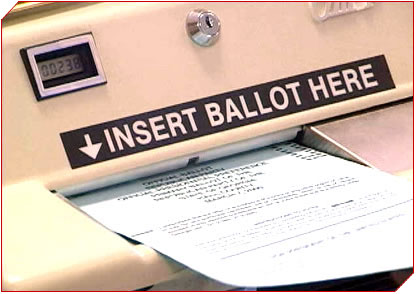Nomination Mechanisms and GOP Party Evolution?
Time to watch a bit of true American exceptionalism in action.
 While there are mechanisms called “primaries” in other countries, there is no country in the world that uses party primaries the way we use them in the United States. Our parties cede nomination authority to the electorate. This has been true for congressional candidates for a century plus.
While there are mechanisms called “primaries” in other countries, there is no country in the world that uses party primaries the way we use them in the United States. Our parties cede nomination authority to the electorate. This has been true for congressional candidates for a century plus.
On the one hand, this sounds democratic, and it is after a fashion insofar as it takes the nomination powers out of the hands of party elites (i.e., the norm worldwide). On the other hand it is not as democratic as it sounds insofar as primaries hardly attract significant turnout and really end up skewing participation to a relatively small group of voters who tend to represent more ideological elements of a given party. As such, the degree to which primaries provide candidates who truly represent the views of partisans in a given districts is questionable. Further, as has been commented in multiple places, this has specific implications for non-competitive districts. Specifically, a highly Republican district might end up electing a representative more conservative than the Republicans in that district because of the primary process. These are issues that get to questions of how representative our representatives actually are.
The argument, by the way, for not using primaries is that it allows a party to present candidates that cleave to a specific program for voters to choose among. Under the primary process, the parties cannot fully control what program it is that they are presenting to the public (as we know, the parties vary significantly regionally across the US). It also means that if a group of citizens are unhappy with the dominant parties they have an incentive to start a third party challenge. Indeed, I would argue that one of the main reasons we do not have serious third parties in the US is that the primary process allows a method by which groups dissatisfied with a mainline party to work from within that party (e.g., the reason that Ron Paul always ran for congress as a Republican, rather than as a Libertarian). Of course, the main manifestation of this phenomenon at the moment is the Tea Party. The Tea Party faction of the Republican Party has no incentive to go the third party route, but every incentive to take the primary route. Players play by the rules of a given game, and they adapt to the options that a given game allows.
This brings us to an interesting natural experiment (via the NY Daily News): Tea Party candidates launch battle against Republican honchos:
A Tea Party insurgency has escalated into a full-scale battle within the Republican Party that could cost the GOP gains they hope to reap from the sickly start of Obamacare.
Seven of 12 Republican senators up for reelection next year now face serious primary challenges from their right, among them Senate Minority Leader Mitch McConnell (R-Ky.).
Sen. John Cornyn (R-Tex.) became the latest with last week’s surprise announcement that firebrand conservative Rep. Steve Stockman (R-Tex.) will run against him.
Now, a clear caveat is that not all challenges are created equal. Stockman, for example, faces a an uphill battle (to be kind) in Texas, as Doug Mataconis noted: John Cornyn Leads Steve Stockman By 44 Points In First Texas Senate Poll. As such, the degree to which Stockman’s challenge of Cornyn is “serious” is debatable, to be kind. The exact quality of all of these challenges will require greater analysis as we approach the actual election season (which in some cases is pretty soon).
Still, recent examples, such as Senate races in Connecticut (2010), Nevada (2010), and Missouri (2012), have demonstrated how primary voters can choose Tea Party candidates who go one to clearly affect outcomes for the GOP due to disjunctions between what the primary electorate finds acceptable and what the general general electorate will accept.
So, the question becomes will this ongoing challenges affect the GOP in such a way that either reshapes the party in a more Tea Party-esque direction or whether the more established elements of the party can reassert itself. Primaries are the place to watch.
In terms of practical politics this comes to issues such as whether we are going to see things like the government shutdown standoffs of earlier in the year or whether we get people like Paul Ryan saying things like “In divided government, you don’t always get what we want.”
As folks of my ilk like to point out in these discussions: institutions matter.





Of course, the problem with candidates picked by party insiders, as American history has shown us, is that those candidates often end up beholden to those insiders and the interests that they represent once in office.
Our primary system may have its flaws, but in general I find it preferable to the way candidates were chosen in the past.
@Doug Mataconis: I am not sure you can make that comparison insofar as the last time we had a system of elite-selection for congressional candidates would be in the 19th century (which was a different world in a lot of ways).
Given that you are libertarian in orientation, I would note that the ability of libertarian-oriented conservatives to run (and vote) in primaries is one of the reasons there is no truly strong movement of the LP to be more than fringe entity. I am not saying that under different circumstances the LP would be viable, but it would change the dynamic between libertarians and the GOP.
I do recognize what I arguing is somewhat counter-intuitive, and it is a position about which I have changed my mind.
I’m no great fan of Alinsky’s Rules for Radicals, but the guy had a pretty damned good insight into things. His Rule 10 seems to apply here:
Before we sack the primary process (which, having given me choices like McCain and Romney, I’m not overly fond of), we should look very, very, very carefully at what we will replace it with.
A couple of other appropriate quotes here: “People tend to get the government they deserve” and Churchill’s observations that “Democracy is the worst form of government — except for all the others and “We can always count on the Americans to do the right thing, after they have exhausted all the other possibilities.”
@Jenos Idanian #13:
First, that is quite the cliche-fest you have going there. The Alinsky reference is quite the non sequitur to boot.
Second, the dynamic I am describing actually doesn’t really apply to the presidential primaries. There are overlaps, but there situation is different for a variety of reasons.
@Steven L. Taylor:
There are seldom primaries at the state and local level, though, and at least in my observation that hasn’t lead to any measurable increase in the quality of candidates.
@Doug Mataconis: Well, at the local level elections are often non-partisan.
Beyond that however, if we are talking (as I am) about national party formation, the place to look is legislative elections.
(Although I would note that the only places you are going to find any examples of third party success, it will be at the state and local level).
Also: you are making the mistake of comparing the US to the US. The real issue is why are their viable third parties in the UK, Canada, and India (which uses the same electoral system as we do). There are multiple factors, to be sues, but the nominations practices matter as they very clearly influence the behavior of office-seeking actors.
I’m afraid that the only real solution is an informed and engaged electorate. Given that that is not likely to roll around soon, I think we’re pretty well stuck.
Open primaries with instant runoff voting might help, but probably only marginally.
@Steven L. Taylor:
I suppose my point is that I do not see the value to our political system as a whole to nominees who are beholden to party insiders vs. nominees who are beholden to the people
@Doug Mataconis: My point is that the degree to which these candidate are truly beholden to the people is questionable.
If we had parties that actually represented clearer programs and were held accountable to put those into practice, then we would be better off. The current system produces politicians who willfully went into the shutdown this year, in contradiction to popular sentiment, and yet with no threat from the electorate. Indeed, the Senators being targeted here tend to be those who oppose those types of tactics. The feedback loop is broken and primaries are part of the issue (although not the only issue).
@Grewgills: This is a major element, yes. But the rules of the game matter (and matter a lot). Primaries are not the most significant issue, but they matter. They certainly matter in terms of of the extremely stable nature of our two-party system.
I loved this quote from the linked article:
@Doug Mataconis: “I suppose my point is that I do not see the value to our political system as a whole to nominees who are beholden to party insiders vs. nominees who are beholden to the people”
And by “people,” Doug means the billionaires who fund their campaigns.
@Doug Mataconis:
As it stands they are still beholden to a small subset of ‘the people’. It is just a different small subset.
When dinosaurs roamed the earth and I was roaming the campus, the usual description of American political parties was that they were non-ideological. At that time the old Confederate states were still the ‘solid south’ for the Dems and there were plenty of northern, urban Repubs. Both parties had a fairly full spectrum of ‘liberal’ to ‘conservative’, altho the Repubs were more ‘business’ oriented and hence ‘conservative’ and the Dems were oriented to Union and ‘working class’ and therefore ‘liberal’.
There have been periods in our history when the parties were more ideological than they are even today; the Federalists and the Jeffersonian Republicans differed so extremely that New England had a serious seccession movement and people fought duels about their politcal differences.
But of the two tendencies, I think that the relatively placid days of the Eisenhower era probably is superior in terms of good policy. The goal of those ‘party bosses’ in their smoke-filled rooms was not noble – to put it kindly. Political victory made for lots of opportunity for graft and patronage, lots of ways to pay back friends and enemies. But making the “people” responsible for choosing candidates in primaries has led to ideological and narrow-band parties and candidates with much worse policy outcomes.
One of an incredibly large list of reasons…
@Jenos Idanian #13:
Humurous….Jenos uses Alinsky to discredit the entire Republican health care fight.
@Grewgills: As a person who votes for 3rd party Presidential candidates, my objection to instant runoff voting is that one must vote for one of the two “major” parties in order for one’s vote to ultimately count. A more honest approach to this issue would be to simply say “stay home, your vote doesn’t count anyway” to parties and voters that cannot capture, say, 20% of the electorate.
The more interesting thing about instant runoff was that is was popular among democrats and liberals in 2000 and among republicans and conservatives in later elections. It smacks of “if we’d had I.R., MY candidate would have won” type sour grapes.
@Just ‘nutha’ ig’rant cracker:
That doesn’t follow. Instant run-off allows more people to vote for their first choice even if that is not one of the major party candidates. Libertarians, Greens, etc can then vote for their preferred candidate and vote for the lesser of two evils as a second choice. There are a few places that use it and it seems to broaden rather than narrow the appeal of smaller party candidates.
@Doug Mataconis:
Huh. I never would have pegged you as someone who supported public funding of elections.
I’m with Grewgills.
A serious, widespread pushback against gerrymandering would also make a big difference.
This is interesting in light of how the Tea Party wing of the Virginia GOP pushed for, and got, a non-primary nomination process for this year’s gubernatorial election.
This, as we all know, resulted in the nominations of Ken Cuccinelli and E. W. Jackson, and consequent GOP loss in both contests.
@Mikey: And that worked so well they’re going to do it again.